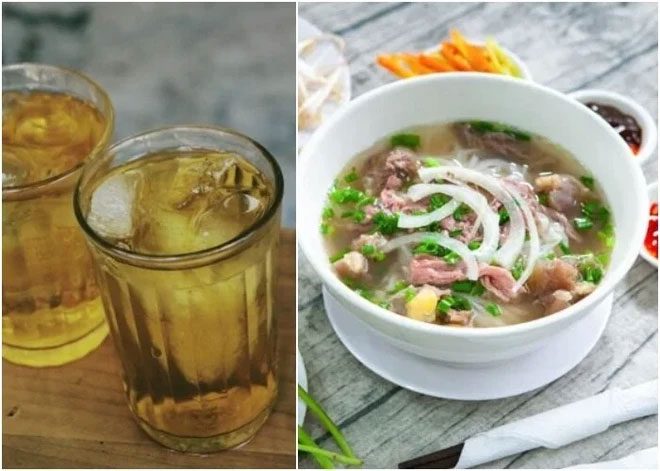Many opinions suggest that pho contains a lot of fat, while iced tea is cold, and combining these two could negatively affect health. Is this true?
According to Associate Professor Dr. Nguyen Duy Thinh, a former lecturer at the Institute of Biotechnology and Food Technology, Hanoi University of Science and Technology, the belief that eating pho and drinking iced tea at the same time is harmful to health lacks scientific basis.
Animal fats, when exposed to cold, tend to clump or solidify, which is a normal biochemical reaction.
However, eating pho and drinking iced tea are different categories. The broth of pho is usually quite hot, while the iced tea, although cold, is not cold enough to cause fat to solidify or clump.

Combining pho and iced tea is not harmful as many believe. (Illustrative image).
Moreover, when these two types of food enter the stomach, the body temperature will cause the molecular structure of the fat to break down and liquefy, after which they continue through the digestion process. Therefore, the rumor that eating pho with iced tea causes fat to clump, solidify, leading to inflammation and cancer is scientifically unfounded.
When eating beef pho, experts advise against drinking overly strong tea. Tea contains a lot of tannins, which inhibit iron absorption, while beef contains a significant amount of iron; therefore, it is advisable to limit or choose more suitable beverages.
When eating rice noodles or pho, people should opt for clear broth instead of fatty broth to reduce fat intake. Eating too much fat increases the risk of diseases such as high cholesterol and lipid disorders.
Associate Professor Dr. Nguyen Thi Lam, former Deputy Director of the National Institute of Nutrition, shares a similar opinion. The claim that eating pho and drinking iced tea causes colitis or even cancer has no scientific basis.
Dr. Lam also does not encourage drinking iced tea while eating beef pho or consuming excessive amounts of iced tea. Iced tea is not harmful to health, but drinking iced tea from street vendors could pose risks from the source of tea, water quality, and food safety.
To protect the digestive system, experts recommend maintaining a balanced diet consisting of four nutrient groups: carbohydrates, proteins, fats, vitamins, and minerals.



















































